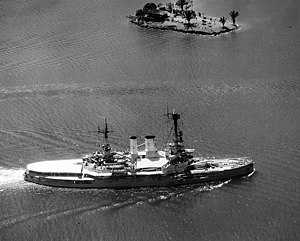SMS Schlesien
 Schlesien transiting the Panama Canal in 1938.
| |
| History | |
|---|---|
| Name | Schlesien |
| Namesake | Schlesien |
| Builder | Schichau, Danzig |
| Laid down | 1905 |
| Launched | 28 May 1906 |
| Commissioned | 5 May 1908 |
| Fate | Destroyed by her crew at Swinemünde in 1945 |
| General characteristics | |
| Class and type | Deutschland-class battleship |
| Displacement | 13,200t normal; 14,218t full load |
| Length | 127.6 m (419 ft) |
| Beam | 22.2 m (73 ft) |
| Draught | 7.7 m (25 ft) |
| Propulsion | 19,330 hp (14,410 kW), three shafts = 19.1 knots (35.4 km/h) |
| Speed | 17 knots (31 km/h) |
| Range | 5,000 nautical miles (9,000 km); 10 knots (20 km/h) |
| Complement | 743 |
| Armament | list error: <br /> list (help) At construction:
Armament in 1939:
|
| Armor | list error: <br /> list (help) 230 mm in belt 280 mm in turrets 76 mm in deck |
SMS Schlesien was a pre-dreadnought battleship of the Deutschland class, commissioned in 1908 into the German Imperial Navy. Her sisters were Deutschland, Hannover, Pommern and Schleswig-Holstein. This class of ships were the last pre-dreadnought battleships built by Germany, and continued to serve in various roles through the years, including service during World War II.
Design
Dimensions and machinery
Schlesien was 413 ft (126 m) at the waterline, and 418.66 ft (127.61 m) overall. She had a beam of 73 ft (22 m) and a draft of 27 ft (8.2 m), and displaced 13,993 tons fully laden. Schlesien was powered by 3 shaft triple expansion engines, which produced 19,000 ihp, and a top speed of 18 knots (33 km/h).
Armament
Schlesien's main armament consisted of four 11 in (28 cm) guns in twin turrets, one fore and one aft of the superstructure. Her secondary battery was composed of fourteen 6.7 in (17 cm) guns and twenty-two 3.4 in (8.6 cm) guns, all casemated along the length of the ship, concentrated particularly amidships. Deutschland also mounted six 17.7 in (45 cm) torpedo tubes.
Armor
Schlesien had an armored belt that was 9 in (23 cm) thick at its strongest points, those which covered the ship's vitals, and tapered to 4 in (10 cm) thick in less critical areas, such as the bow and stern. The turrets had 11 in (28 cm) of armor protection, a full inch thicker than the preceding Braunschweig class. The deck was covered by 3 in (7.6 cm) of armor plate.
Service history
The start of World War I saw Schlesien serving alongside her sisterships in the II Battle Squadron of the High Seas Fleet. She participated in the Battle of Jutland alongside her class-mates, as well as the Braunschweig class battleship Hessen.
Being thoroughly obsolete, she was one of four old ships of the line, along with Schleswig-Holstein, Hannover and Hessen, that Germany was permitted to retain after the end of World War I, under the terms of Versailles Treaty. After a short period as an accommodation ship during 1919, she was used thereafter for training until 1926, when she was the subject of a major overhauling. Her rangekeeper was replaced as well as her boilers, while her funnels were retrunked.[1] The upgraded Schlesien made several trips as a School ship at the end of the 1930s. The Schlesien made goodwill visits to ports in the Americas, some of them for propaganda purposes, like the trip to Argentina at Christmas 1937, when she anchored at Mar del Plata. Her crew was invited by the Argentine navy minister to Buenos Aires, where they attended several social events.[2] She did see some action in World War II providing artillery support to German land forces in the Baltic, both during the 1939 Polish campaign and the 1945 Soviet offensive on East Prussia. Along with her sister ship Schleswig-Holstein, she took part of the battle of Hel, on September 18 1939.[3] After being converted into an escort unit by 1944, the Schlesien bombarded Soviet positions near Danzig in March 1945. She was eventually mined and scuttled by her own crew at the end of the war. Used as a target by the Soviets after the conflict, Schlesien was broken up between 1949-56, although remnants of her hull were still visible until the 1980s.[1]
Notes
- ^ a b SMS/KMS Schlesien
- ^ Newton, Ronald C.: The Nazi menace in Argentina (1937-1947). The Board of Trustees of the Leland Stanford Junior University, 1992, pp. 184-185. ISBN 0804719292
- ^ Commanger, Henry Steele: The Story of the Second World War, Brassey's, 2003, page 17. ISBN 1574887416
See also
![]() Media related to Schlesien (1906) at Wikimedia Commons
Media related to Schlesien (1906) at Wikimedia Commons
External links
- Wikipedia introduction cleanup from April 2009
- Articles covered by WikiProject Wikify from April 2009
- Deutschland class battleships
- Ships built in Danzig
- 1906 ships
- World War I battleships of Germany
- Battleships of the Reichsmarine
- Battleships of the Kriegsmarine
- World War II battleships of Germany
- World War II shipwrecks in the Baltic Sea
- Maritime incidents in 1945
